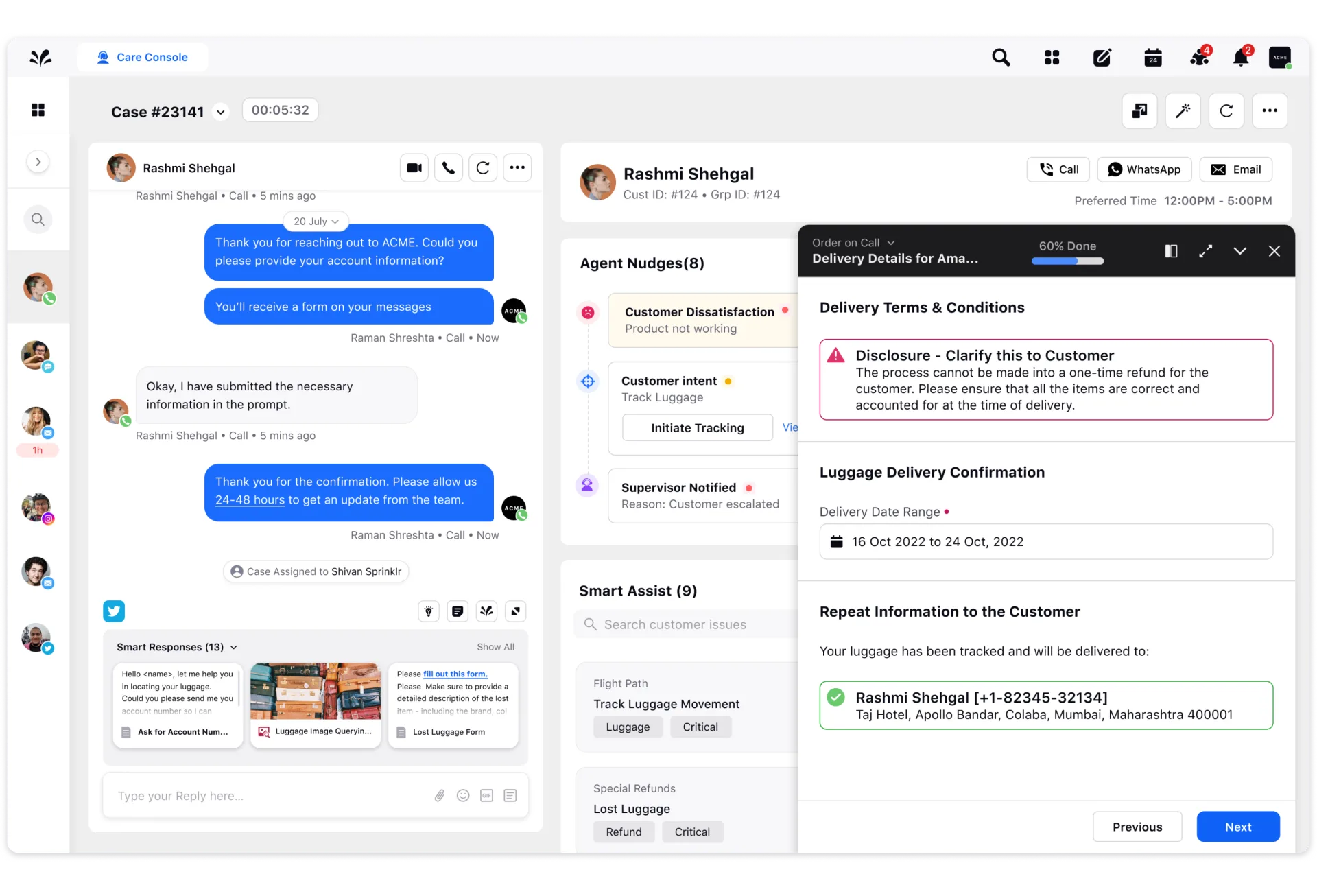Contact center training is a meticulously structured program designed to equip customer service agents with the skills, knowledge and tools to manage customer interactions across various contact center channels, including phone, email, chat and social media.
The primary goal of contact center training extends beyond mere issue resolution. In today's fiercely competitive landscape with an increasing emphasis on customer experience, contact center training endeavors to gain a deeper understanding of customers' needs, fostering proactive customer service. Here are the key objectives and goals:
Improve communication and problem-solving skills: Agents undergo training to listen actively, articulate responses clearly and adapt their communication style to various customer inquiries and situations.
Enhance product and service knowledge: A profound understanding of the company's products or services is paramount. Agents with relevant knowledge can accurately address customer queries and propose solutions more efficiently.
Elevate technology proficiency: Proficiency in contact center software and contact center CRM systems is indispensable. Contact center training imparts the technical knowledge necessary for efficient issue resolution, impacting critical metrics such as average handle time and first contact resolution.
Instill adaptability: Adaptability across diverse customer service channels, including phone, email, chat and social media, is a crucial skill for contact center agents to have these days. Agents trained in channel-switching can seamlessly provide consistent service, contributing to a positive brand image.
Emotional intelligence: Emotional intelligence is vital for handling sensitive situations, ensuring empathetic interactions and building lasting customer relationships. Customer-obsessed companies often hire communication coaches to train agents in emotional intelligence to connect more effectively with customers, collaborate well, and respond appropriately to various situations.
Continuous learning: Contact center training emphasizes the importance of constant learning to ensure that agents stay abreast of evolving customer expectations and technological advancements, contributing to sustained excellence in customer service.
Why is contact center training important?
Here’s why it is essential to invest in regular, high-quality contact center training sessions:
Enhances customer satisfaction: Well-trained agents resolve queries quicker and deliver a more personalized service experience, leading to customer satisfaction.
Improves operational efficiency: By equipping agents with key skills, training reduces the time taken to resolve issues, leading to more calls handled per hour and quicker responses. Efficient agents contribute to higher productivity and profitability as more customer issues are resolved in less time, reducing operational costs.
Reduces turnover and enhances agent retention: Because contact center training gives agents the opportunity to enhance their skills, they feel valued and more satisfied with their jobs. This, in turn, makes them less likely to quit, and so businesses benefit from reduced turnover and onboarding costs. Training modules around coping strategies also help agents deal with high-stress situations, which are a hallmark of the job. This reduces the chances of agent burnout.
Helps agents adapt to change: Contact center training keeps agents updated on emerging technologies and trends, such as artificial intelligence (AI) in customer service and omnichannel customer service. Adapting to technological advancements at work helps agents perform better in their roles.
For instance, understanding AI-driven tools helps agents work more efficiently, and familiarity with omnichannel strategies enables them to provide seamless customer experiences across various platforms. This adaptation not only benefits the contact center through improved service delivery but also enhances the overall customer experience.
Now that we've established the benefits of strong contact center training programs, you need to hone in on a model that is best suited to your organization. In the section below, we'll outline the types of contact center training so you can figure out what works best.
Types of contact center training
It's important to remember that contact center training covering comprehensive training modules is ideal, as you can cater to various requirements and preferences.
Type of contact center training | Benefits |
Onboarding training | Introduces new agents to the company, its culture, policies and basic job responsibilities |
Product/service training | Focuses on in-depth knowledge of the products or services the contact center supports |
Communication skills training | Enhances verbal and written communication skills, including active listening, customer empathy and tone modulation |
Technology training | Familiarizes agents with the tools and systems they'll use, such as CRM software, telephony systems and knowledge bases |
Soft skills development | Builds skills like problem-solving, critical thinking, time management and stress management |
Customer interaction scenarios | Involves role-playing and scenario-based training to prepare agents for real-life customer interactions |
Multichannel training | Teaches skills for managing various communication channels, including phone, email, live chat and social media |
Contact center compliance and security training | Ensures agents understand and adhere to data protection regulations, security protocols and company policies |
Crisis management and escalation procedures | Trains agents on handling difficult situations, de-escalation techniques and protocols for escalation |
Cultural sensitivity and diversity training | Builds awareness and understanding of diverse customer backgrounds, promoting inclusive language and communication |
Quality assurance training | Involves regular monitoring and feedback sessions to maintain and improve service quality |
You may choose one or several of the training types above for your agents. But once you make a choice, ensure you follow the best practices for your industry. To help you along, we've included some tips below.
8 contact center training tips every manager should know
These eight tips will help you build a robust training program that keeps your agents engaged as they learn.
🎯Convey goals clearly
In contact center training, it's important to set specific and realistic goals based on a thorough training needs analysis (TNA). For instance, goals like improving first contact resolution (FCR) within the next quarter, reducing average handling time without compromising service quality or enhancing customer satisfaction (CSAT) scores are tangible and measurable goals that you set at the beginning of a training session. Then, revisit them once the training is concluded.
Communicate these goals in precise terms to help agents understand the expected outcomes of the training. Encourage open dialogue and allow agents to ask questions and clarify doubts. This reinforces their understanding and helps them internalize these goals.
Clear goal setting minimizes ambiguity and ensures that everyone is aligned with your contact center's performance targets.
📊Utilize analytics and data
Leveraging analytics and data is fundamental to enhancing the impact of contact center training. By analyzing data from a powerful platform, managers can identify areas of improvement. For example, if the data shows a high number of repeated calls on specific issues, this indicates a need for better training in those areas.
Metrics like call handling time, customer satisfaction scores and first-call resolution rates provide invaluable insights into training effectiveness. Ensure you review these metrics regularly so you can customize your training programs and reduce gaps in your agents' skill sets.
You should also use customer interaction analytics to anticipate future training needs based on emerging trends in customer interactions. This data-driven approach ensures that your training is always relevant and targeted, which improves agent performance and customer satisfaction.
Good to know: Advanced analytics and reporting software empower supervisors to oversee their agents' handled cases comprehensively. It unveils crucial insights, including channel utilization, sentiments and agent behavior. These insights ensure compliance and quality and enable informed decisions on agent self-learning, training, scheduling and engagement strategies.

💻Offer in-depth technical training during onboarding
A good onboarding experience sets the tone for the rest of an agent's journey at your contact center. Your onboarding training must prepare new agents for the demands of a contact center environment right from day one. Roll out learning modules on contact center software usage, navigating the interface, accessing customer information and managing calls efficiently.
Onboarding training should also cover the basics of initiating and concluding calls, ensuring every customer interaction starts and ends on a positive note. Another crucial aspect is teaching seamless call transferring across departments. Explain the technical process and the etiquette involved, such as muting and unmuting calls appropriately during transfers to maintain professionalism and customer privacy.
Further, agents should learn how to set up and manage conference calls, a vital skill for resolving complex issues that may require input from multiple team members or departments. Such comprehensive technical training during onboarding equips agents with the skills to operate effectively and confidently in a contact center setting.
Good Read: Set Your Team Up for Success with Tailored Onboarding
📝Customize training to handle angry customers
Unfortunately, dealing with frustrated customers is a part of working at a contact center. So customized training to deal with angry customers sensitively is crucial in contact center environments. This specialized training involves techniques for de-escalating situations, empathetic listening and problem-solving strategies tailored to high-tension scenarios.
By learning how to effectively handle irate customers, agents can extract positive outcomes from negative interactions. If an interaction that starts off negatively ends on a positive note, customer satisfaction shoots up. Thus, it's important to train agents to maintain their composure and professionalism in challenging, high-stress situations.
👊Develop a buddy ecosystem
You or the coaching software aren't the only ones who can train your agents. Their more experienced colleagues, who have seen it all and been with your organization for a while, also qualify as good trainers.
Assigning new or inexperienced agents a 'buddy' or a peer whom they can turn to for doubts and queries gives the agent's manager a break from the constant handholding. It also improves interpersonal relationships between your agents.
📚Build a knowledge base
It's helpful to create an easily accessible, comprehensive repository of everything an agent needs to know to do the job. This should include detailed information about your products and services, brand guidelines and training materials. Such knowledge base software is a vital tool for just-in-time communication in contact centers because it becomes a go-to reference that agents can consult during customer interactions.
It is equally important to train agents on how to navigate this knowledge base. They should know how to quickly look for reference guides to respond to FAQs. This is crucial to maintain the flow of conversation without significant pauses or inaccuracies.
Do you know: By integrating advanced tools like AI-powered agent assist software, you can further enhance the utility of your knowledge base. Agent assist software, backed by Sprinklr AI+, goes beyond by recommending past cases, relevant knowledge base articles and guided workflows based on the ongoing conversation. The outcome? Efficient issue resolution and a noticeable reduction in average handling time for your agents.

🏆Reward milestone achievements
Rewards are a great way to keep your agents motivated and productive. Implement a system that rewards your agents whenever they achieve a milestone, perform well, outdo their peers or for team efforts.
These rewards could be tokens of appreciation like a gift card or public shoutouts. The important thing is to acknowledge and appreciate good work.
💬Use call recordings for specific training sessions
Call recordings are invaluable for training agents to handle complex scenarios like dealing with angry customers, responding when unsure of an answer or addressing demands for unjustified refunds. By viewing real-life call examples, agents can learn effective communication strategies and problem-solving techniques.
These recordings, an integral part of call management, also provide actionable guidance on how to de-escalate tension, offer solutions when answers aren't immediately available and handle sensitive refund requests diplomatically.
✅Upgrade your training regularly
Like your agents’ skillsets and the software tools you employ, your training programs also need a regular upgrade. Make sure your training modules are up-to-date and address emerging challenges and service gaps.
While you can count on these tips to improve the efficacy of your contact center training, choosing the right software can significantly reduce your effort.
But how do you pick the right tool?
How to choose the right contact center training tool
When scouting for the right contact center training software, here is a list of factors that you must consider before making your choice.
📍 Accessibility
If you employ a hybrid working model, your agents will work from within the office and outside. Therefore, your training tool should be accessible remotely via the website and app. The interface should be user-friendly and intuitive, featuring a clean design that presents training modules, agent scores and progress in a way that requires minimal navigation effort.
📝 Customization
The tool should be customizable as per your center's needs. You should be able to pick and create the modules, select the skills you want to train your agents in, schedule personalized training sessions and closely monitor the agent’s training progress in real time.
🔄 Automation
The tool should also host contact center quality management features to help you evaluate all your customer conversations. Uncover real-time agent performance and compliance-related insights to deliver contextual, constructive feedback.
💼 Contact center training: An agent’s armor
As customer expectations evolve, untrained agents are at a significant disadvantage, leading to fragmented customer experiences and potential churn. So, businesses are investing substantially in comprehensive contact center training programs to keep their agents adept and satisfied in their roles.
The initial step for optimal success in your training initiatives involves integrating your contact center with Sprinklr Service—an intuitive, AI-native customer service software. With a short ramp-up time for new agents, extensive automation to prevent burnout, and Sprinklr AI+ that stays at the forefront, Sprinklr Service allows you to manage growing customer issues efficiently at scale.
Take action today by booking a personalized product walkthrough.
Frequently Asked Questions
related products
Thank you for contacting us.
A Sprinklr representative will be in touch with you shortly.
Contact us today, and we'll create a customized proposal that addresses your unique business needs.
Request a Demo
Welcome Back,
No need to fill out any forms — you're all set.


